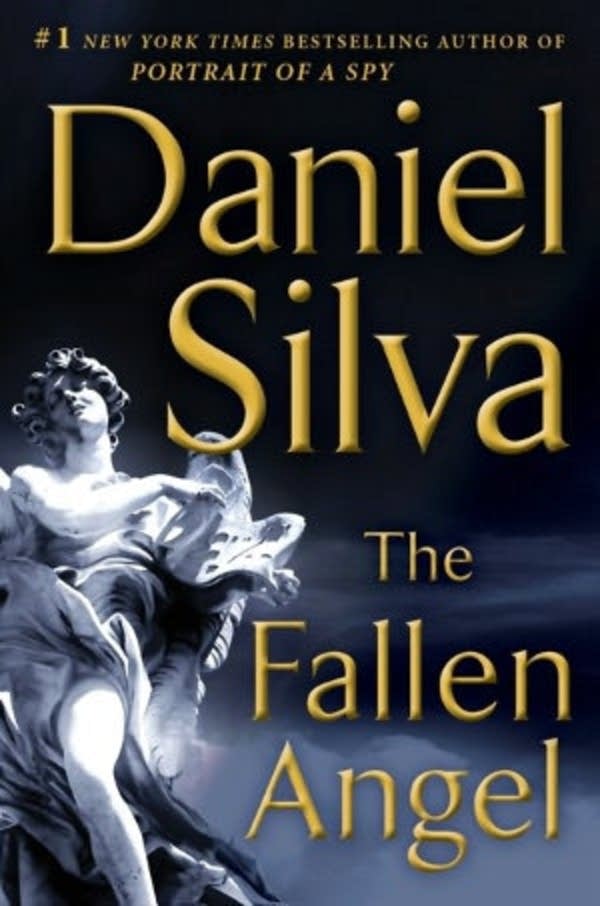Daniel Silva's Israeli spy rides again in 'The Fallen Angel'
Go Deeper.
Create an account or log in to save stories.
Like this?
Thanks for liking this story! We have added it to a list of your favorite stories.

Daniel Silva's latest spy novel, "The Fallen Angel," opens with a murder in St. Peter's Basilica to weave a mystery of corruption in the Vatican. The story follows Gabriel Allon, an art restorer and Israeli intelligence agent.
Silva joined The Daily Circuit to talk about his new novel.
Interview Highlights
Turn Up Your Support
MPR News helps you turn down the noise and build shared understanding. Turn up your support for this public resource and keep trusted journalism accessible to all.
On the 40th anniversary of the "Munich Massacre"
Silva's series featuring Gabriel Allon was launched with the idea of seeking revenge for the "Munich Massacre" at the 1972 Munich Olympics. This week, the International Olympic Committee rejected requests to hold a moment of silence at the 2012 London Olympics.
"I was caught off-guard when I was asked about it ... I suppose I was saddened by the news and ultimately not terribly surprised by it. You have to remember that on the day after it happened in Munich in 1972, [IOC President] Avery Brundage made his decision that the games of peace should resume right away. ... I cannot image why, 40 years after this terrible stain on the Olympic movement, why we can't have a few moments of silence to remember those 11 innocent victims."
On the Gabriel Allon character
"It was never intended to be a series at all. I fully expected that Gabriel Allon, this character I created for a book that I called "The Kill Artist," was going to appear in one novel, and one novel only, and then sail off into the sunset. My publishing team at Putnam asked me to write a second novel featuring Gabriel, and I told them flat-out that they were crazy, that it would never work. I truly believed there was too much anti-Israeli sentiment in the world for an Israeli character to be a truly viable mass market hero. I've been happily proven wrong. That doesn't change that there's anti-Israeli sentiment in the world, but the series has worked in spite of that.
"He carries a great deal of baggage in his life. Because his work has a terrible impact eventually on his own life and family. Palestinians target him for reprisal. His son was killed. His first wife was gravely wounded. ... I'm constantly reminded when I spend time in Israel with people who do the sorts of things my character does, that Gabriel Allon's story, while tragic, is so common in Israel in terms of families that suffer bereavement."
On the writing process
"When I was first starting in my writing career, I didn't use humor to the degree I do now. But I think that's a consequence of writing the same character and the characters around him (he has a supporting cast of really well-developed characters around him). Each have their own passionate fan base within my readers. They are old friends to the readers and they are old friends to me.
"Sometimes, when I put two characters on the page, ... I feel less like a writer and more like a stenographer. I understand them so well, I just have to put them in motion and write down what they say. ... I think of writing a novel not necessarily as sitting at the keyboard and composing a story, but remembering a story that I already know and writing it down. I sit, and in my subconscious and in my sleep, think about scenes and dream about scenes. And if you get it right, you sort of have that magic moment. It does flow quite well."
On Middle East intelligence chiefs
"In Egypt, in Syria, they can be incredibly ruthless and oppressive men. I lived in Egypt. I had my run-ins with the Egyptian security service. They're crafty, they're wily, they're intelligent, they're cosmopolitan. And I certainly wouldn't want to be a citizen of any of the so-called Arab republics."
On the use of scripture
"I'm a regular reader of scripture and belong to a scripture study group in Washington. I used the Bible extensively for portions of this novel. When people read this book and read the climax, they should imagine me in my office and in my home with 50 books and maps and charts spread all over the floor trying to map out this final climactic scene. So I know my way around scripture pretty well. I knew where to look to find descriptions of the Temple of Solomon and how it worked."
Dear reader,
Political debates with family or friends can get heated. But what if there was a way to handle them better?
You can learn how to have civil political conversations with our new e-book!
Download our free e-book, Talking Sense: Have Hard Political Conversations, Better, and learn how to talk without the tension.




